Campaign
Abortion and Suicide
Abortion and Suicide
The Irish Government legalised abortion on suicide grounds in Ireland. But on January 8th of the same year, Government hearings held by the Joint Oireachtas Committee on Health and Children considered evidence from leading medical experts on this issue.
That evidence demolished the case for legalising abortion on suicide grounds. Now we're making sure that evidence is heard by the entire nation.
6 key points that the medical experts made:
1. All of the medical experts agreed that abortion is never a treatment for suicidality
2. None knew of a case where an abortion was the only treatment for a woman who was suicidal.
3. None knew of a case where a woman had died by suicide because abortion was not available.
4. Senior psychiatrists testified that abortion would be "completely obsolete" in respect of a person who is extremely suicidal.
5. Evidence was given that abortion can actually increase the risk of suicide.
6. Experts confirmed that suicide in pregnancy is very rare - and that treatment for suicidality included providing safety, nursing, psychological treatment and medication.
See the evidence in this two-minute video
Other Evidence
- Psychiatrists from St Patricks' Hospital also wrote that there is no evidence that "medical experts are able to predict suicide.
- The Chairman of the Irish Association of Suicidology has also said that that legislation based on the X case would create a ‘logistical nightmare’ for psychiatrists.
- Eleven top psychiatrists have also written to the government advising them that abortion is not a treatment for suicidality.
Making the evidence known
The Life Institute is sharing this crucial evidence through our powerful video and by placing the advert (below) in local & national newspapers - 40 ads have been booked to date, and will be seen by up to 6.8 million readers.
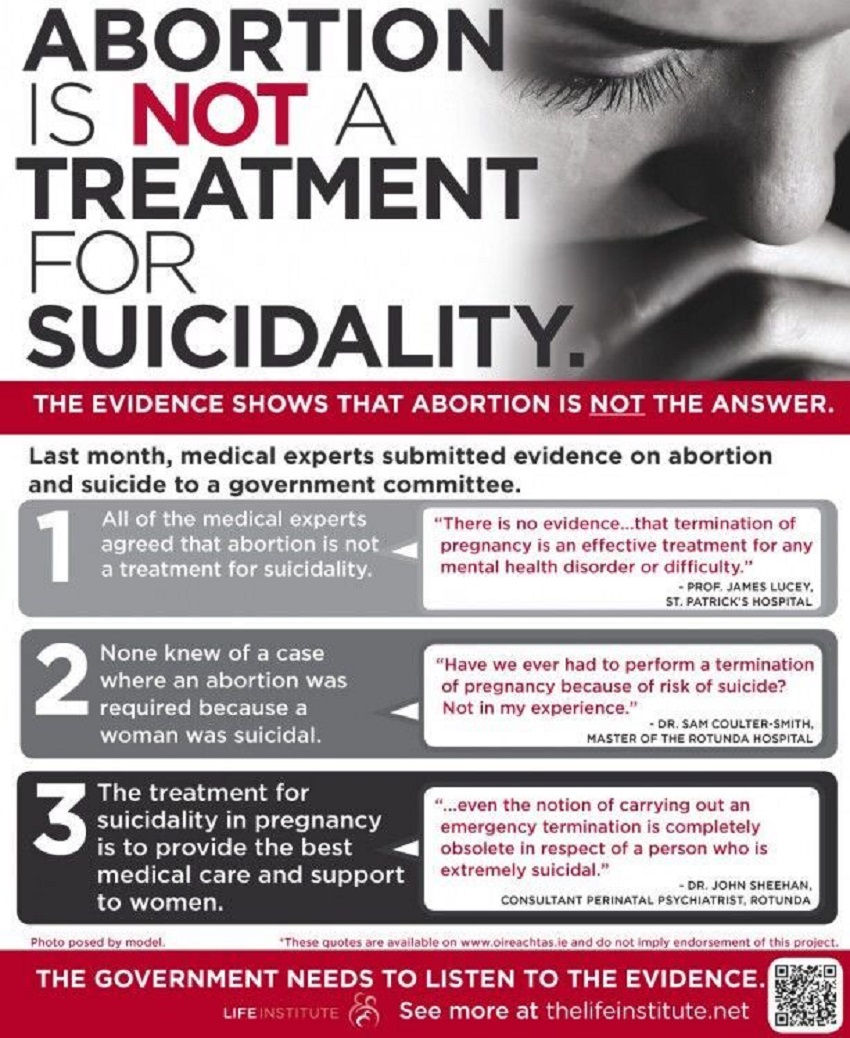
1. All of the medical experts agreed that abortion is never a treatment for suicidality
"There is no evidence either in literature or from the work of St Patrick's University Hospital that indicates that termination of pregnancy is an effective treatment for any mental health disorder or difficulty".
Prof James Lucey, St Patrick's University Hospital
"On the suicide issue, we need to become very focused on the fact there are other treatments for suicide. If a male patient pitched up in accident and emergency tonight and said he wanted to kill himself, there would be medical treatments, drugs and therapies, and these would be reviewed in a couple of weeks. That is the first-line treatment, and cases are reviewed after a couple of weeks."
Dr. Mary McCaffrey, OB/GYN, Kerry General Hospital
"All appropriate mental health supports need to be made available for women who are at risk of suicide, have threatened to commit suicide or have suicidal ideation. The committee can ask the psychiatrists, but most people would agree that the termination of pregnancy is not a treatment in this regard."
Dr Sam Coulter Smith, Master of the Rotunda Hospital
On the issue of suicide, nobody is suggesting that termination of pregnancy is a cure for mental anguish or the disorders associated with suicide ideation
Dr. Rhona O’Mahony, Master of National Maternity Hospital, Holles Street
"..there is no evidence that abortion reduces suicide risk in pregnant women, and there is some evidence that it may have a negative effect in some instances."
Professor Patricia Casey, Mater Hospital and UCD
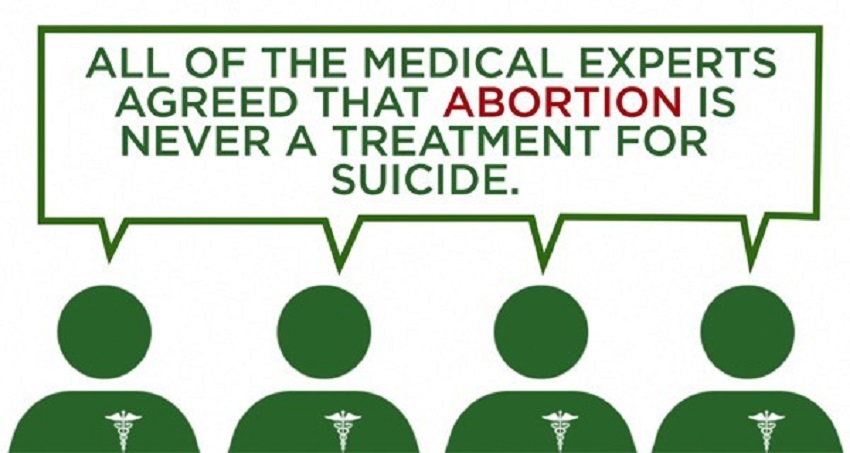
2. None knew of a case where an abortion was the only treatment for a woman who was suicidal
"However, we have not had the experience of seeing any women who were suicidal where the appropriate treatment for their suicidal feelings would have been a termination of pregnancy."
Dr Anthony McCarthy, College of Psychiatry
"Although we have discussed this among the group [of 12 Obstetricians and Gynaecologists}, I personally have no knowledge of ever having cared for a woman who wanted to end her life specifically because of a pregnancy, and in my pursuit of information over the past week or so, I have been unable to identify any other consultant who did know of such a woman, which backs up the information we already have - i.e., that this is an extremely rare situation.
That was their opinion having practised abroad. In all of their clinical experience and practise they had not met a woman citing suicidal intent or ideation purely because she was pregnant. That was the view of the 12 consultants involved."
Dr. Mary McCaffrey, OB/GYN, Kerry General Hospital
"I was asked if we have ever had to perform a termination of pregnancy because of risk of suicide; not in my experience."
Dr Sam Coulter Smith, Master of the Rotunda Hospital
"I refer to Deputy Terence Flanagan's question on whether we, as perinatal psychiatrists, have ever seen a situation in which termination of pregnancy has been the treatment for a suicidal woman. To reiterate our statement, with more than 40 years of clinical experience between us, we have not seen one clinical situation in which this is the case."
Dr. John Sheehan, Consultant Perinatal Psychiatrist, the Rotunda Hospital
"However, one must remember that it is absolutely individual and for us, with our 40 years of experience, we have never assessed a woman for whom our management would be to advise a termination and for the legislators, this must be taken into consideration."
Dr Joanne Fenton, Consultant Perinatal Psychiatrist, the Coombe Women's Hospital
"In my work as a psychiatrist, I run the attempted suicide service in the Mater Hospital in which we see and assess more than 400 attempted suicides in women per year. I have never seen a pregnant woman who was suicidal for whom an abortion was the only answer."
Prof Patricia Casey, Mater Hospital and UCD
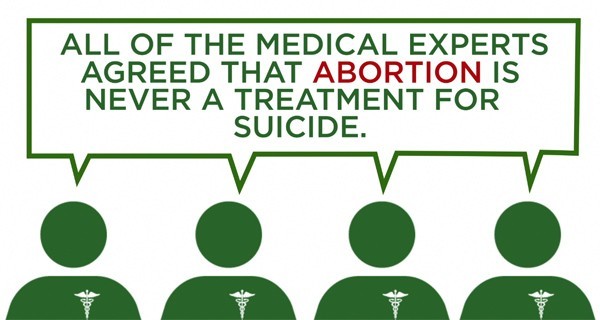
3. None knew of a case where a woman had died by suicide because abortion was not available
"I am not aware of any death from suicide because a termination was declined."
Dr. Mary McCaffrey, OB/GYN, Kerry General Hospital
"As regards mental health issues in pregnancy and following pregnancy, it was stated earlier that the incidence of mental health issues in pregnancy is approximately 10% to 15%. The risk of suicide in pregnancy is extraordinarily low. We all know that women can suffer from post-natal depression and that the risk of suicide remains following pregnancy. It is my belief that the risk of suicide can increase a little post natally. However, that is an issue which the committee can explore later in more detail with our psychiatric colleagues."
Dr Sam Coulter Smith, Master of the Rotunda Hospital
4. Senior psychiatrists testified that abortion would be an inappropriate treatment in respect of a person who is extremely suicidal
"Someone who is intensely suicidal often needs admission to hospital. It is exactly the opposite to the medical intervention and, consequently, even the notion of carrying out an emergency termination is completely obsolete in respect of a person who is extremely suicidal. I reiterate that in our practice, we see people who are profoundly depressed, who feel hopeless, worthless or utterly helpless to deal with situations. In such situations, one can see clearly the intervention usually is to admit such people into hospital, day hospital or home care but the intention is to support and help them through the crisis they are in. It is not to make a decision that is permanent and irrevocable."
Dr. John Sheehan, Consultant Perinatal Psychiatrist, the Rotunda Hospital
"If the woman is profoundly depressed and mentally ill, she would be advised not to take any major life decision at that time, and frequently admission to hospital might be advised. Ongoing review and monitoring would typically be required."
Dr Anthony McCarthy, College of Psychiatry
5. Evidence was given that abortion can actually increase the risk of suicide
"There is also a study which was carried out in Finland, which I did not have an opportunity to refer and which focuses on related suicide in women who had abortions or miscarriages or who gave birth. That study indicates that among those who had abortions, the suicide rate was three times the national average. In those who gave birth, it was half the national average. There is data to support the proposition that there is no evidence that abortion helps women's mental health."
Prof Patricia Casey of the Mater Hospital on a study which has found that women who undergo abortions were six times more likely to die by suicide.
"Every one of us working in the perinatal service will have seen women who had terminations of pregnancy and who will feel profoundly guilty about that during a subsequent pregnancy, and it will have a negative effect on them."
Dr Anthony McCarthy, College of Psychiatry, National Maternity hospital
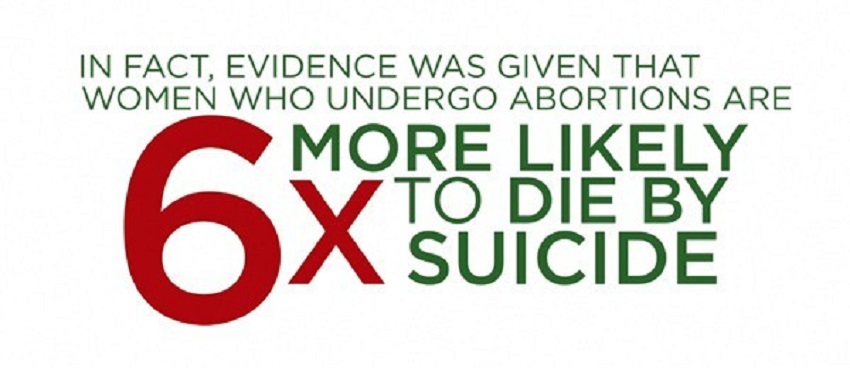
6. Experts confirmed that suicide in pregnancy is very rare - and that treatment for suicidality included providing safety, nursing, psychological treatment and medication
"The risk of suicide in pregnancy is extraordinarily low."
Dr Sam Coulter Smith, Master of the Rotunda Hospital
"Suicide rates are lower in pregnant women than in non-pregnant women. International studies suggest that the suicide rate in pregnancy is from a third to a sixth of the expected rate in non-pregnant women, indicating that frequently pregnancy confers a protective effect against suicide."
Dr Anthony McCarthy, College of Psychiatry
"On the suicide issue, we need to become very focused on the fact there are other treatments for suicide. If a male patient pitched up in accident and emergency tonight and said he wanted to kill himself, there would be medical treatments, drugs and therapies, and these would be reviewed in a couple of weeks."
Dr. Mary McCaffrey, OB/GYN, Kerry General Hospital
As Dr Jacqueline Montwhill, consultant psychiatrist, has said, the treatment for suicidality in a pregnant woman "is to make sure that the patient is safe, make sure that patient is on the appropriate medication... and to make sure that the appropriate psychological treatment, support, intervention and nursing support is made available to her.
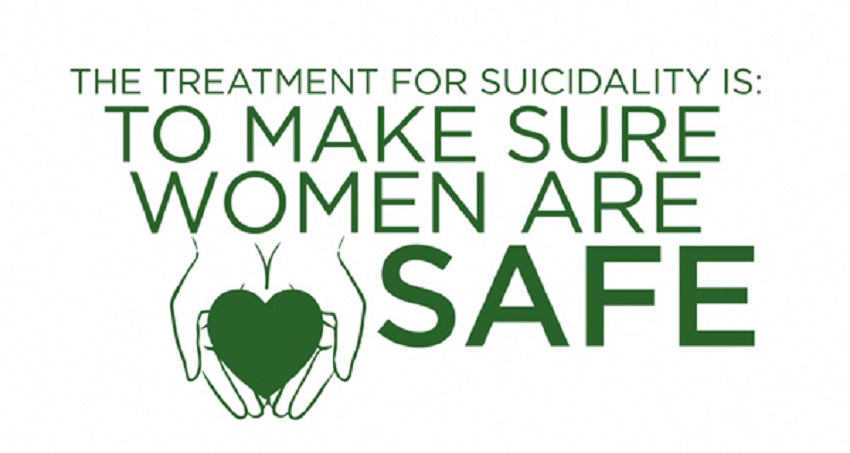
There is no evidence that "medical experts are able to predict suicide"
In a written submission to the Oireachtas Committee, the heads of country's largest psychiatric hospital, St Patrick's University Hospital in Dublin, have said there is no evidence that "medical experts are able to predict suicide".
In the submission, medical director Professor James Lucey and Paul Gilligan, CEO of St Patrick's, emphatically state that there is "no evidence either in literature or from the work of St Patrick's University Hospital that indicates that termination of pregnancy is an effective treatment for any mental health disorder or difficulty".
"Logistical nightmare" for psychiatrists
Separately, the Chairman of the Irish Association of Suicidology has said that legislation based on the X case would create a ‘logistical nightmare’ for psychiatrists if implemented.
Dr Justin Brophy, a consultant psychiatrist with Wicklow Mental Health Service made his comments an interview with an Irish language newspaper, Gaelscéal.
Dr Brophy said that medical judgements can be wrong and psychiatrists will be on a “hiding to nothing” if asked to adjudicate in these cases. He told Gaelscéal that suicidal intent is an 'easily fabricated condition' and that while psychiatrists can show that a woman is suicidal based on her stated symptoms, it is very difficult for them to prove that a woman who says she is not suicidal is not, nor is it their job to do so.
He added if a law were passed allowing for abortion on the terms of the X case that there would be public outrage if a pregnant woman took her own life after a being refused an abortion based on a psychiatrists view that she was not suicidal.”
Dr Brophy's comments come in the wake of other misgivings expressed by leading mental health experts.
11 consultant psychiatrists's write to Fine Gael
11 top-level consultant psychiatrists have also written to Fine Gael advising them that "termination of pregnancy is not a psychiatric treatment for suicidality, nor is it mentioned as such in any of the major textbooks of psychiatry''.
The letter also expresses the belief that "offering an abortion to a distressed person who is psychiatrically ill would be strongly ill-advised since the person's capacity to make important life decisions is frequently impaired".
Former Fine Gael leader, Mr John Bruton, has opposed legalising abortion on suicide grounds.
Mr Bruton said that "when you actually look at the words in the constitution which talk to an equal right to life. Well, a possibility is never equal to a certainty. All you can ever say about suicidal ideation is that there is a possibility that it might be fulfilled, whereas in the case of a termination you have the certainty of the ending of that other life ... I believe this is a fundamental human rights issue, the less visible the person is, the more their human rights ought to be vindicated."
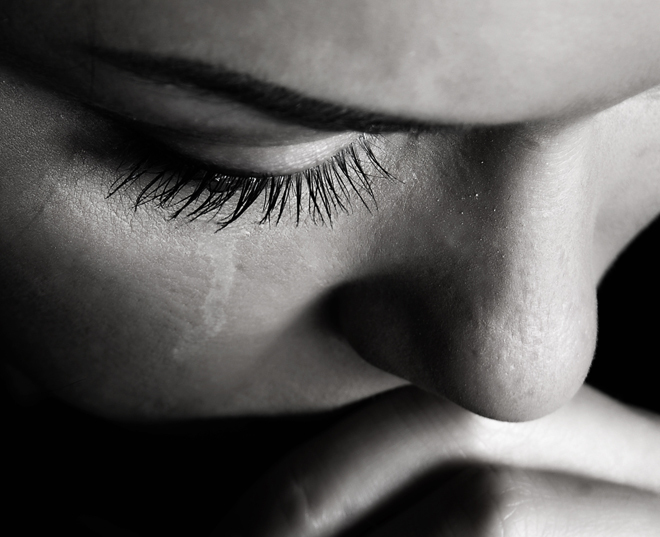
113 psychiatrists disagree with abortion proposal
113 psychiatrists have signed a statement saying that legislation, which would allow for abortion as a treatment for threat of suicide, has no basis in medical evidence.
Four leading psychiatrists who carried out the survey of around 300 psychiatrists in the country. They are Dr Martin Mahon, Connolly Hospital, Dr Bernie McCabe, Navan Hospital, Dr Richelle Kirrane, Connolly Hospital and Prof Patricia Casey of the Mater Hospital. Of those who replied, 14 of the doctors disagreed with the statement.
Dr McCabe said: “I am not surprised that so many of our colleagues agree that the proposed legislation is flawed. As members of the medical profession, we have a duty to our patients to adopt best practice and an evidence-based approach to everything we do.
“The fact is that there is no evidence that abortion is a treatment for suicidality in pregnancy and may in fact be harmful to women. The Government must take this into account and reconsider its proposals.”
She said: “In total, 302 letters were sent to consultant psychiatrists there was over a 40pc response. Doctors were given the option to sign their names or reply anonymously. Almost 90pc of respondents agreed with the statement.
Text of the Statement:
- As practicing psychiatrists we are deeply concerned at the Government’s stated plan to legislate along the lines of the X-Case, as this will mean legislating for suicidality.
- We believe that legislation that includes a proposal that an abortion should form part of the treatment for suicidal ideation has no basis in the medical evidence available.
- We as psychiatrists are being called upon to participate in a process that is not evidence based and we do not believe that this should be asked of the profession.
- Any proposal being considered by the Government must be based on a rigorous appraisal of the available psychiatric research and medical evidence.
- Article in the Irish Independent
Links
- See more from the Committee Hearings here...
- See more on abortion for mental health grounds here
- Listen to Prof Patrica Casey on RTE News at One
- Prof Casey: Vista created by abortion law too cruel and terrible to contemplate